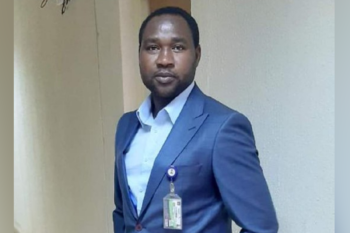
Today, MPs debated blasphemy laws and allegations in Commonwealth countries. Each of the speakers raised particular concern over repressive laws in Nigeria and Pakistan, with most speaking out on Mubarak Bala, President of the Nigerian Humanist Association, who was recently sentenced to 24 years in prison for a ‘blasphemous’ post on Facebook. Humanists UK briefed MPs ahead of the debate, including by producing statistics showing that Commonwealth countries are much more likely than others to have laws against blasphemy or apostasy. MPs drew repeatedly on that analysis.
Humanists UK campaigns for freedom of religion or belief (FoRB) around the world, particularly for non-religious people facing persecution. In many countries it is impossible to be openly non-religious. Laws that criminalise blasphemy and apostasy are often the source of such persecution – as they were in Mubarak Bala’s case. The repeal of such laws is therefore a vital step in guaranteeing FoRB for all.
Jim Shannon MP (Democratic Unionist Party), Chair of the All-Party Parliamentary Group on International FoRB – of which Humanists UK is a stakeholder – secured the debate. He opened by highlighting those statistics, and by raising a number of high profile cases including that of Pakistani Christian Asia Bibi, and Nigerian humanists Mubarak Bala. Disappointingly, however, he also argued that milder blasphemy laws are sometimes acceptable, instead only challenging their perceived misuse. Humanists UK strongly disagrees with this, since even disused blasphemy laws (as are found among some western countries) still nevertheless are relied upon by countries like Pakistan to justify their own laws.
Fiona Bruce MP (Conservative), the Prime Minister’s Special Envoy on FoRB, sought assurances from the UK Government that they would appeal to countries like Nigeria and Pakistan to address mob violence, that sees the murder of those accused of blasphemy and apostasy. She also emphasised the importance of due process, the right to fair trial and the cessation of arbitrary enforcement of blasphemy and apostasy laws. And she raised the case of Mubarak Bala.
Brendan O’Hara MP Scottish National Party Spokesperson on International Human Rights, said:
‘Nigeria is a deeply, deeply religious country which in numerical terms is almost evenly split between Christians and Muslims. But there are also those who follow traditional African religions and those who have no religion. And in a country so divided along religious lines, Nigerian Humanists need someone to defend their corner, particularly after the jailing of Mubarak Bala.’
He requested an update from the Foreign, Commonwealth and Development Office (FCDO) in their recent work towards securing Bala’s release. His recommendations included that the UK Government calls on all Commonwealth countries who have people in prison on blasphemy charges, to immediately release those prisoners; for the UK to offer asylum to those accused of blasphemy, along their families, who are at grave risk of extrajudicial violence; and for the UK to work towards the eventual abolition of all blasphemy legislation across the Commonwealth.
Shadow Foreign Minister Fabian Hamilton MP – who is also a member of the All-Party Parliamentary Humanist Group, – questioned why blasphemy laws were necessary at all. He said:
‘These laws, in both theory and practice, harm individuals and societies… They are wrong in principle, and they are open to abuse. And of course the enforcement of blasphemy laws varies significantly between countries, but the fact they are still on the books in so many places should be a cause of concern for all of us in this House.’
In her response, Minister of State Vicky Ford MP addressed the actions that have been taken in Mubarak Bala’s case:
‘I’ve raised this case personally with the Nigerian Foreign Minister. I’ve stressed to him that defending freedom of religion or belief, including non-belief [sic], is a human rights priority. We are following Mr Bala’s case closely. And indeed officials from our High Commission in Abuja raised Mr Bala’s case with the Nigerian Human Rights Commission again last week.’
Humanists UK Director of Public Affairs and Policy Richy Thompson said:
‘We are grateful to those who contributed to this debate. In particular, we are pleased to see widespread, cross-party support for Mubarak Bala.
‘However, it is essential that so-called dead letter blasphemy laws are repealed. Not only can these laws be re-enacted at any time. They can be, and have been, pointed to by the most repressive regimes as justification to keep blasphemy and apostasy laws on their books.
‘Blasphemy laws intrinsically contravene human rights. They are subjective and therefore inconsistently applied, undermining any legal certainty. Blasphemy laws violate the human right to freedom of expression. They protect religious beliefs , practices, institutions, and leaders from legitimate and often necessary criticism. They are used to justify extrajudicial mob violence against minorities.’
Notes:
For further comment or information, media should contact Humanists UK Director of Public Affairs and Policy Richy Thompson at press@humanists.uk or phone 020 7324 3072 or 020 3675 0959.
Read our briefing ahead of today’s debate in Parliament.
Read more about our international work.
Humanists UK is a member of the End Blasphemy Laws Campaign, founded by Humanists International.
Humanists UK is the national charity working on behalf of non-religious people. Powered by 100,000 members and supporters, we advance free thinking and promote humanism to create a tolerant society where rational thinking and kindness prevail. We provide ceremonies, pastoral care, education, and support services benefitting over a million people every year and our campaigns advance humanist thinking on ethical issues, human rights, and equal treatment for all.
